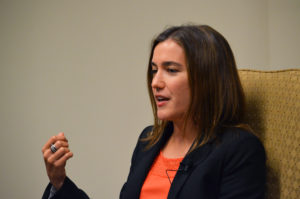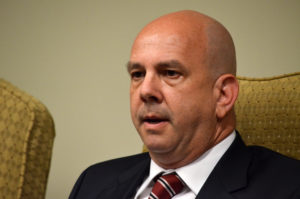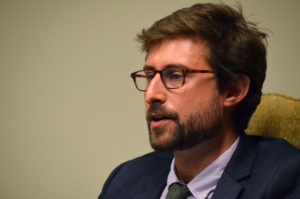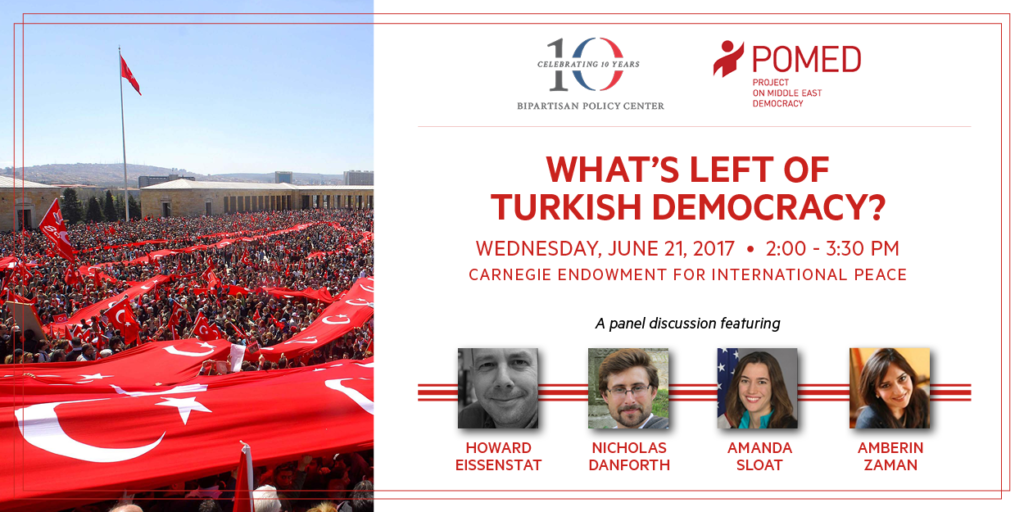Wednesday, June 21, 2017
2:00 – 3:30 p.m.
Carnegie Endowment for International Peace
Featuring:
Howard Eissenstat
Associate Professor, St. Lawrence University;
POMED Nonresident Senior Fellow and author of
the POMED report “Erdogan as Autocrat: A Very Turkish Tragedy”
Nicholas Danforth
Senior Policy Analyst, Bipartisan Policy Center
Amanda Sloat
Fellow, Harvard Kennedy School;
Former Deputy Assistant Secretary of State
Southern Europe and Eastern Mediterranean Affairs, 2013-2016
Amberin Zaman
Columnist, Al-Monitor
Moderator:
Amy Hawthorne
Deputy Director for Research, POMED
On June 21, 2017, the Project on Middle East Democracy and the Bipartisan Policy Center hosted an event entitled “What’s Left of Turkish Democracy?” The following is a summary of the discussion.
Panelist Remarks

Amanda Sloat described her impressions from a recent visit to Turkey. A year after the attempted coup, many in the United States and Europe do not fully appreciate how traumatizing the event was. There remains a “pervasive climate of anxiety and uncertainty,” a vulnerable state apparatus, and a feeling of vulnerability and paranoia in Turkish society. The indefinite state of emergency and the crackdown on dissent has had a distinct “chilling effect” on civil society. The purges of state institutions carried out under the guise of targeting those alleged to have been involved in the coup attempt have created uncertainty among the populace. The Turkish government is changing the boundary of what is permissible politically, which has led to a narrowing political space for dissent, shrinking press freedom, and a lack of public confidence in institutions. Despite these serious challenges, however, Turkish civil society is showing some resilience, Sloat argued. Amidst an unfree and potentially unfair voting environment, it is notable that 48 percent of the Turkish electorate voted against the April constitutional referendum to give sweeping new powers to President Recep Tayyip Erdoğan. As another example, in June 2017, the government withdrew a proposal to allow developers to build industrial facilities in olive groves due to popular opposition. Head of the opposition Republican People’s Party (CHP) Kemal Kiliçdaroğlu’s current “march for justice” from Ankara to Istanbul is another sign of active opposition. The “silver lining,” Sloat said, is that “civil society is not dead—people are still willing to stand up and engage.”
Howard Eissenstat discussed the impact of the constitutional referendum, which creates an executive presidency system. “We know the referendum was played on an uneven terrain,” Eissenstat argued, citing widespread reports of institutional bias against the “No” campaign and of ballot rigging. Hopes that Erdoğan would end the state of emergency after his referendum victory and take other steps to normalize the political situations were wishful thinking. Eissenstat does not believe that “now, or in the foreseeable future, we will see a fundamental shift” in the President’s behavior—“Erdoğan will be Erdoğan.” Instead, the purge “will expand” as the government is continuing to expropriate property of real and alleged opponents, to bring legal action against journalists, and to fight a costly conflict against the Kurdistan Workers’ Party (PKK).
 The results of the referendum were not ideal for the ruling Justice and Development Party (AKP) despite its structural advantages, Eissenstat said. The vote was extraordinarily tight as the AKP and the Nationalist Movement Party (MHP) did not receive the strong support they expected for a “yes” vote – the official tally was 51.41 percent for “Yes” and 48.59 percent for “No”. The close result indicates that political instability will continue, especially as some members of the AKP break from Erdoğan and the “tentacles of the purge” extend further and even start to start to touch elements of the AKP itself. Erdoğan will “take the changes he won to the bank, but the narrowness of the victory points to some real weaknesses,” Eissenstat argued. The referendum made things more complicated for the President—“no one was happy with the results” due to the slim margin of victory. The results demonstrated the limitations of the People’s Democratic Party (HDP), the pro-Kurdish opposition party, in opposing Erdoğan, although it is difficult to determine the HDP vote accurately owing to the widespread displacement and disenfranchisement of Kurdish voters. It appears that the HDP lost some support, and with most of its leadership imprisoned, the party is no longer a serious force in Turkish politics. The MHP also underperformed in the referendum, despite the strong support of party leaders for the “Yes” campaign, indicating lack of unity in the party on the issue. The other opposition party, the CHP, recognizes that it must change tactics in order to survive in this new environment. Kiliçdaroğlu’s “march for justice” is a sign that it is resorting to new tactics to mobilize popular support against Erdoğan.
The results of the referendum were not ideal for the ruling Justice and Development Party (AKP) despite its structural advantages, Eissenstat said. The vote was extraordinarily tight as the AKP and the Nationalist Movement Party (MHP) did not receive the strong support they expected for a “yes” vote – the official tally was 51.41 percent for “Yes” and 48.59 percent for “No”. The close result indicates that political instability will continue, especially as some members of the AKP break from Erdoğan and the “tentacles of the purge” extend further and even start to start to touch elements of the AKP itself. Erdoğan will “take the changes he won to the bank, but the narrowness of the victory points to some real weaknesses,” Eissenstat argued. The referendum made things more complicated for the President—“no one was happy with the results” due to the slim margin of victory. The results demonstrated the limitations of the People’s Democratic Party (HDP), the pro-Kurdish opposition party, in opposing Erdoğan, although it is difficult to determine the HDP vote accurately owing to the widespread displacement and disenfranchisement of Kurdish voters. It appears that the HDP lost some support, and with most of its leadership imprisoned, the party is no longer a serious force in Turkish politics. The MHP also underperformed in the referendum, despite the strong support of party leaders for the “Yes” campaign, indicating lack of unity in the party on the issue. The other opposition party, the CHP, recognizes that it must change tactics in order to survive in this new environment. Kiliçdaroğlu’s “march for justice” is a sign that it is resorting to new tactics to mobilize popular support against Erdoğan.
Amberin Zaman discussed the effects of the coup attempt on the peace process with the Kurdish armed opposition, as well as on policies toward Kurds outside the country. Zaman disagreed with Eissenstat’s statement about HDP underperformance in the referendum, arguing that the results do not directly translate into support for the AKP and that southern Turkey was the “least level playing ground in the country” due to vote rigging and other tactics. She argued that the peace process was already dead by last summer, due to Erdoğan’s decision to walk away from promising peace negotiations in February 2015. Erdoğan was unwilling to negotiate seriously due to the growing influence of Kurdish militias in Syria and because the Kurds were not supportive of his project to expand presidential powers. The collapse of the negotiations was followed by the collapse of the ceasefire last summer, which Zaman described as one of the saddest moments in Turkish history. The popularity of the HDP in the 2015 legislative elections, when the party crossed the electoral threshold and entered parliament, created a “great opportunity for Turkey to move forward” on resolving the Kurdish conflict through politics.  But this progress was soon erased as war between Turkey and the PKK reignited. The coup attempt gave Erdoğan new ammunition against the Kurds, especially as he is “determined to defeat them on the battlefield” instead of pursing a political solution. Erdoğan is interested in creating his own Kurdish movement through the groups like Huda-Par and Kurds who are supportive of the President of Iraqi Kurdistan, Masoud Barzani. There is “no room for the peace process as we knew it,” at least before the 2019 presidential and parliamentary elections.
But this progress was soon erased as war between Turkey and the PKK reignited. The coup attempt gave Erdoğan new ammunition against the Kurds, especially as he is “determined to defeat them on the battlefield” instead of pursing a political solution. Erdoğan is interested in creating his own Kurdish movement through the groups like Huda-Par and Kurds who are supportive of the President of Iraqi Kurdistan, Masoud Barzani. There is “no room for the peace process as we knew it,” at least before the 2019 presidential and parliamentary elections.
Zaman posited that the coup attempt and its aftermath did not have a major impact on Turkey’s relationship with the Iraqi Kurds, but Barzani was very quick to express his support for Erdoğan in the wake of the events, and Erdoğan will rely on Barzani’s support to mobilize anti-PKK Kurds in Turkey. The U.S. decision to provide arms to the People’s Protection Units (YPG) in Syria was a “big slap in the face” for Erdoğan. (The YPG is the military wing of the Democratic Union Party, PYD, a Syrian Kurdish nationalist group with close ties to the PKK. The Turkish government makes no official distinction between the YPG and PKK, and considers both to be parts of the same terrorist group.) The collapse of central authority in the Kurdish areas of Syria and the military partnership between the Syrian Kurds and the United States are comparable to the situation with the U.S.-enforced no-fly zone in Iraq in 1991 that led to the solidification of Iraqi Kurdistan, Zaman observed.
Nicholas Danforth argued that despite the current dominant narrative that it doesn’t matter if Turkey is autocratic as long as it continues strategic cooperation with the United States, ignoring the authoritarian slide is short-sighted and dangerous. The decline of Turkish democracy could have serious consequences for the U.S.-Turkey relationship. Rising authoritarianism would ensure ongoing and intensified anti-Americanism and would make cooperation on key regional issues even more difficult. Danforth noted that Erdoğan had tempered criticism of the United States since President Trump’s inauguration, in order to try to build relations with the new administration, but Erdoğan may quickly return to harsh rhetoric if tensions increase.
 The United States has a history of working with authoritarian regimes, but Turkey is demonstrably different than autocratic countries like Saudi Arabia that do not make a pretense of being democratic, while Erdoğan and those around him are very invested in portraying a façade of democracy. Whereas other authoritarian allies can discuss security or stability with the United States, Erdoğan’s rhetoric keeps the focus on Turkey’s democratic deficit, ensuring continued criticism from the United States and Europe. As a result, Erdoğan will “have to come up with some way to explain to his public why the United States, Europe, and other democratic countries don’t accept Turkey as a democracy,” and anti-Americanism will likely bridge that gap.
The United States has a history of working with authoritarian regimes, but Turkey is demonstrably different than autocratic countries like Saudi Arabia that do not make a pretense of being democratic, while Erdoğan and those around him are very invested in portraying a façade of democracy. Whereas other authoritarian allies can discuss security or stability with the United States, Erdoğan’s rhetoric keeps the focus on Turkey’s democratic deficit, ensuring continued criticism from the United States and Europe. As a result, Erdoğan will “have to come up with some way to explain to his public why the United States, Europe, and other democratic countries don’t accept Turkey as a democracy,” and anti-Americanism will likely bridge that gap.
The United States counts on authoritarian allies to provide stability, but authoritarian Turkey does not seem destined to be stable due to numerous internal and external conflicts and an economy close to crisis. ISIS’s terrorist campaign inside Turkey, threats from Kurdish militant groups like the Kurdistan Freedom Falcons (TAK), and the arrival of new militants in Turkey could inflame the situation after the Syrian regime retakes the city of Idlib, which is currently controlled by the al-Qaeda affiliated rebel group Hay’at Tahrir al-Sham (HTS). The country is already intensely divided, with a populace that has little trust in institutions and widespread rumors of armed militias loyal to Erdoğan, which could quickly destabilize the situation in the event of another crisis. Politically motivated arrests could quickly extend to members of all four major political parties, which would take the country into dangerous territory. Danforth argued that “in the best-case scenario, it’s a very rocky road for U.S.-Turkish relations ahead in the near term, and in the long term, Turkey may face a steep precipice at the end of the road it is on.”
Finally, Danforth noted that he found it difficult to be positive about prospects for democratic resilience, especially as the leadership of the HDP is already imprisoned, and all other opposition is facing threats. The United States may choose to double down on Erdoğan as the only figure who can maintain stability, but this is unwise. Erdoğan has consolidated his power to the point that if there were a serious challenge to his rule and “if he was going to go down, he could take the country down with him.”
Audience Q & A
Q: What should the United States do to help Turkish democracy?
The most helpful step, Danforth said, would be to pursue a political solution to the conflict between the government and the PKK. This will be very difficult, however, so realistically the United States should focus on trying to keep the current situation from getting worse. The terrorist threat is intensifying, and further attacks will destabilize the country. The United States maintains some leverage over the PKK, Danforth stated, and if there is a PKK campaign against civilian targets in Turkey, there should be consequences for the U.S.-YPG relationship.
Sloat observed that it is always a challenge in U.S. policy to find the correct balance between pursuing interests and advancing values. Turkey’s NATO membership requires the United States to be concerned about Turkish democracy. If the United States and Europe turn away from Turkey, it will likely seek partners elsewhere (such as Russia). There is a risk that intense public criticism likely would “trigger further anti-Americanism.” But the Trump administration must find ways to strategically raise specific concerns both publicly and privately about democracy and human rights instead of taking a purely “transactional approach” to the relationship with Ankara.
Zaman argued that American leverage over Turkey is often overstated, and the United States is likely to soften its stance on the PKK as long as it needs the YPG as a military partner against ISIS in Syria. Despite these limitations, the United States “should continue to raise its voice and continue to treat Turkey like a democracy because it is a useful fiction to maintain.”
She pointed out the European Union has a substantial economic and political relationship with Turkey, more so than the United States, and thus is a key actor. But Europe is in a state of flux and the EU’s relationship with Turkey is complex, in part because of European efforts to work with Turkey to host Syrian refugees who might otherwise seek to enter Europe.
Eissenstat said that the international community must speak up about Turkey’s deteriorating democracy, and take “the long view” that includes the possibility of unexpected developments that could alter the situation inside the country. Policymakers should not assume that the current status quo will last indefinitely, he argued: “One can envision certain circumstances where the Turkish government shifts,” and “the possibility exists of a coalition that could viably challenge Erdoğan in 2019.” The audience for U.S. diplomacy promoting human rights and democratic values is not only Erdoğan, but also the wider Turkish public, including the AKP base, most of which believes in the basic values of rule of law and personal freedoms.
Q: What is the economic impact of the mass purge of state employees?
More than 100,000 people have lost their jobs in the purges, and they have struggled to find other jobs, while the seizure of their passports renders them unable to leave the country, Sloat mentioned. Within the overall population of Turkey (around 80 million), the purge probably won’t have a sustained long-term effect on the national economy, Sloat said, but it will create a not-insignificant pool of people who will be unemployed for the foreseeable future. Their long-term prospects are uncertain. The government is creating a commission to review cases of termination, but the structure will be slow, bureaucratic, and likely politicized.
Eissenstat described how the AKP has capitalized on the purges to place loyalists in positions of power and to appropriate the businesses of accused Gülenists. The purge is “part of a longer story of the AKP wresting control of the public sector,” he explained. It is not clear that under these circumstances Turkey can have a successful and stable economy and attract foreign investors–the country cannot have “a market economy and a regime that engages in purges.”
Q: Is it true that there was an uptick in PKK activities around the time of the attempted coup?
Zaman stated that the PKK was reacting to the government’s increasingly offensive posture. This problem cannot be solved through military means, Zaman contended: the PKK largely exists due to the failure of Turkish state to address the Kurds’ long-running grievances. “I do not expect the PKK to fix the Kurdish problem. I expect my government, the government to which I pay taxes, to fix the problem,” she added
Q: Will the Turkish government give citizenship to Syrian refugees in the country?
Giving citizenship to the three million Syrian refugees in Turkey would be the humane thing to do, Zaman argued, and from Erdoğan’s perspective would also likely create new votes for the AKP. A mass offer of citizenship, however, would be politically impossible due to opposition from many Turks. The Turkish people have displayed immense grace in their handling of huge Syrian refugee population, but the idea of granting citizenship is controversial.
Q: Why is Turkey siding with Qatar in the current GCC crisis?
Sloat said that Turkey is acting in part due to its close financial relationship with Qatar, but she does not believe that Turkey is looking to become deeply embroiled in the conflict. The recent decision to move a limited number of Turkish troops to Qatar was a symbolic move, and the result of a basing agreement in the works since 2014. Turkey had wanted to present itself to the new Trump administration as an appealing potential partner against Iran, Danforth said, in the hope that this would strengthen Turkey’s position regionally. However, Turkey’s pro-Qatar stance, which is similar to Iran’s, shows that aligning with the United States unconditionally against Iran doesn’t actually fit with Turkey’s own foreign policy preferences. Zaman noted that a pro-Qatar position is in line with popular sentiment among many Turks. She mentioned a recent column in the Daily Sabah by Erdoğan’s spokesperson İbrahim Kalın defending Qatar and the Qatari and Turkish backing of the Muslim Brotherhood as an example of the government’s justification for its position.
Q: What could lead to a decline in support for Erdoğan?
Eissenstat stated that Erdoğan can’t afford for the Turkish economy to tank, or for Turkey to “look like a dictatorship.” Erdoğan needs an opposition that will “sit in Parliament yelling at him and contesting elections,” but not a viable-enough opposition to challenge his authority. The march for justice from Ankara to Istanbul poses a discomforting choice for Erdoğan, as he will have to either choose to forcibly stop the march or allow Kiliçdaroğlu to walk into the suburbs of Istanbul and possibly gather thousands of people in the streets. Danforth added that pro-government media has criticized the march, but has begrudgingly admitted that Kiliçdaroğlu has the democratic right to take this action. Zaman mentioned that it is important to recognize the double-standard of Turkish politics—if the HDP mounted a similar effort, the leaders would face serious consequences.
Q: Can Turkish foreign policy be seen as an extension of domestic policy?
According to Eissenstat, Turkish foreign policy is linked intrinsically with an attempt to gain domestic support through nationalism, but Erdoğan’s nationalist foreign policy decisions also are often heartfelt. Zaman questioned the extent of the United States’ willingness to put up with this type of Turkish foreign policy. Sloat added that there is a perception in Turkey that anti-American campaign rhetoric is permissible and that “no one can hear it outside of Turkey.” But given the global communications of the modern world, there are legitimate consequences to aggressive rhetoric, as evidenced by the fallout from Erdoğan accusing German Chancellor Angela Merkel of employing “Nazi measures” during a diplomatic spat earlier this year. Zaman pointed out that the investigation of former National Security Advisor Michael Flynn and scrutiny of his lobbying for Turkey, and the violent clashes in front of the Turkish Embassy in Washington during Erdoğan’s visit in May, have increased the focus on Turkey in American politics. Danforth said that there is a perception of Erdoğan as dichotomous: a supremely clever and skilled politician who deals with national issues in a very personal and emotional manner. Domestically, though, Erdoğan’s emotional instincts and willingness to personalize politics and punish his enemies have proved to be quite practical and effective. But these traits clash more in foreign policy when Erdoğan doesn’t always have the ability to follow through on his threats and posturing, as seen for example in his failed push to topple the Assad regime in Syria.
Q: Do the referendum results indicate a rural-urban divide in the AKP?
Eissenstat urged caution in reading too much into the regional breakdown of the referendum vote, noting that local patronage systems and familial relations may have had more of an impact on voting patterns than geographic location. A strong urban-rural split is possible, but it is hard to know conclusively from the information available to date about election results. Sloat said that the AKP is actively concerned about such a split, with Erdoğan’s party looking to replace city mayors with politicians who could promote AKP policies more effectively. Zaman added that there is apathy at the grassroots level of the AKP because of a lack of enthusiasm for the executive presidency plans.
Q: What is the future of the Gülen movement?
Danforth said that it is possible that the government could eventually choose to show leniency to some of the tens of thousands of purged Gülenists, making their social rehabilitation dependent on begging forgiveness and expressing their newfound loyalty for Erdoğan. Zaman said this was unlikely. Gülenists are trying to separate themselves from the alleged perpetrators of the failed coup in order to continue the global movement. Eissenstat noted the complexity and secrecy of the Gülenist movement: it can be understood as a sub-state structure in Turkey, as an international political organization, and as a religious movement. Sloat concluded by stating that she did not see much of a short-term future for the movement inside Turkey, especially as it has been deemed a terrorist organization, but international Gülenist networks may survive.

